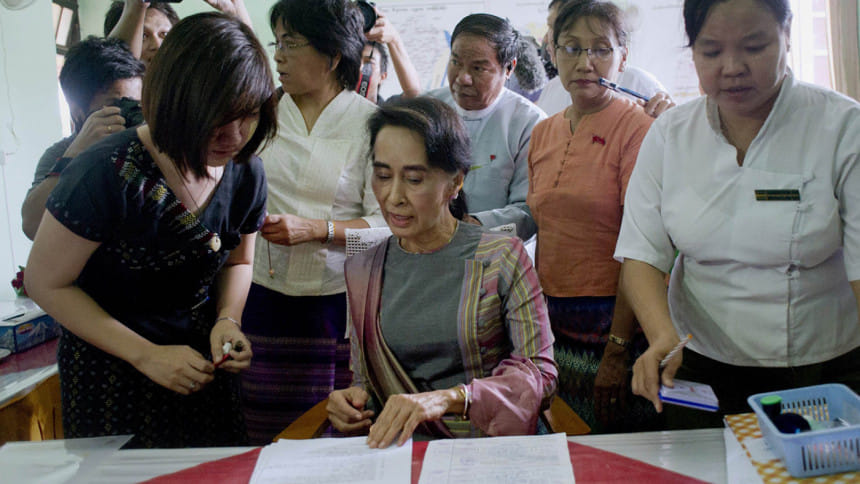Myanmar ruling party braces for poll slump

Myanmar's opposition leader Aung San Suu Kyi on Wednesday registered to run for a general election which her party is expected to sweep, as the ruling bloc admitted it was bracing for big losses.
Hundreds of cheering supporters gathered in the township of Thanlyin, a two-hour drive from Yangon, as Suu Kyi formally registered her intention to stand again for the rural constituency of Kawhmu in November polls.
The veteran activist, the first candidate confirmed by the National League for Democracy (NLD), was thronged by singing and flag-waving activists but did not address the crowd.
Candidates cannot begin campaigning until election officials give the green light, NLD spokesman Nyan Win told AFP.
"Everyone is waiting for that," he said.
In contrast to the jovial atmosphere in Thanlyin, Suu Kyi's main political opponents in Yangon revealed signs of creeping pessimism as tensions mount between the leader of the ruling Union Solidarity and Development Party (USDP) and the powerful army.
The USDP, the semi-civilian reincarnation of the previous junta which is packed with former soldiers, won a landslide in dubious 2010 elections when it ran virtually unopposed. Suu Kyi remained under house arrest at the time and her party boycotted the vote.
But the ruling party has already started to manage expectations about its fate at the upcoming polls.
"We don't expect a winning result like in 2010. It's impossible," USDP general secretary Maung Maung Thein told reporters at an event announcing Yangon regional candidates.
TENSIONS WITH ARMY
Relations have soured dramatically between the still powerful army and the party's influential leader and parliamentary speaker Shwe Mann, who is widely considered a presidential hopeful.
Shwe Mann has faced opposition from soldiers in his constituency in recent days over his readiness to support Suu Kyi in her efforts to change the constitution, which bars the opposition leader from top political office.
But the former junta number three posted comments on his official Facebook page insisting he acted "in the interest of the country" and suggested he was ready to defy both the army and President Thein Sein.
Recalling a recent interview where he was asked if he would stand with Suu Kyi against the president and the army chief, he said it would be more exact to say he was with Suu Kyi and "the people".
The soldiers' hostility to Shwe Mann has cast doubt over the political allegiances between the ruling party and the military that spawned it, heightening uncertainty as the country heads towards elections.
Myanmar began emerging from military rule after the 2010 polls with a new government led by Thein Sein that has introduced broad political and economic reforms, ending decades of isolation and heralding an investment rush in the resource-rich nation.
But Suu Kyi, who entered parliament in 2012, has warned that reforms have stalled, with activists locked up and press freedoms curtailed.
She remains excluded from the presidency because of a clause in the junta-drafted 2008 constitution which bans candidates with foreign children. Her two sons are British.
The military, which occupies a quarter of seats in the legislature, has staunchly refused to countenance a reduction of its political role.
Last month it voted down a series of charter change draft bills, including one that would have removed its veto on constitutional amendments.

 For all latest news, follow The Daily Star's Google News channel.
For all latest news, follow The Daily Star's Google News channel. 



Comments